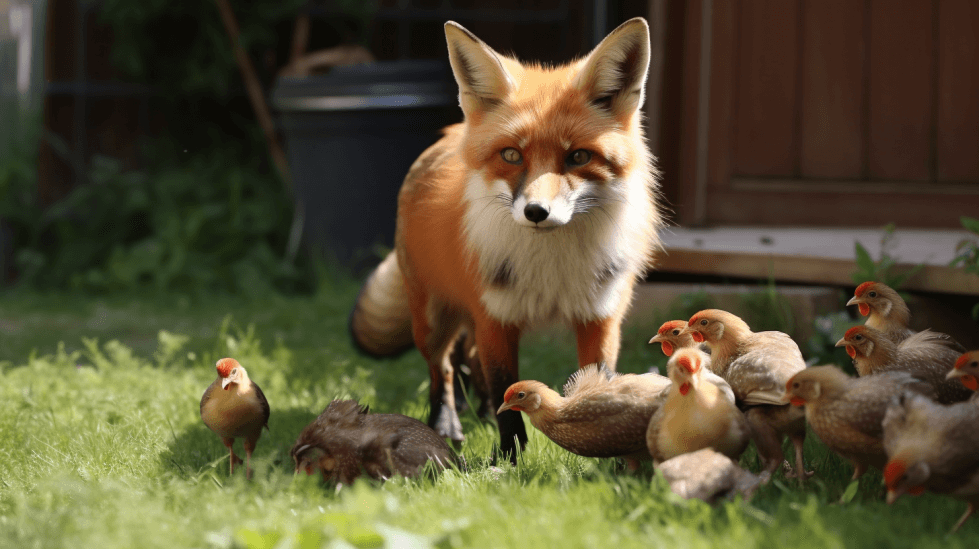How to Keep Foxes Away from Chickens
Raising chickens in your backyard can be a rewarding experience, but it also comes with its fair share of challenges. One significant challenge that chicken keepers face is the constant threat posed by foxes. These cunning predators are known for their ability to easily make their way into chicken coops, resulting in significant losses and heartbreak for the owners. In this article, we will discuss some practical ways to keep foxes away from your chickens, ensuring that both you and your feathered friends can enjoy the benefits of backyard farming without worrying about these sneaky predators.

Understanding the behaviors and capabilities of foxes is critical to deter them from your chicken coop. By implementing a combination of fundamental precautions and secondary deterrent measures, you can significantly reduce the likelihood of a fox attack on your chickens. Additionally, taking into consideration the location of your coop and learning from the experiences of other chicken keepers can help guide you in developing the most effective strategy for fox deterrence.
Key Takeaways
- Employ a combination of primary and secondary measures to deter foxes
- Consider coop location and learn from fellow chicken keepers
- Understand fox behavior to develop effective strategies
Understanding the Threat of Foxes
As a chicken keeper, I often worry about the safety of my flock, especially from predators like foxes. Fox attacks on chickens are common, and they can be a significant threat if not addressed appropriately. Foxes are nocturnal animals, which means they are most active during the night, and this is often when they pose the biggest danger to our feathered friends.
There are several species of foxes, but the most common fox that threatens chickens is the red fox. The threat of foxes is not limited to just one, as they usually live in a fox family, comprised of a male, a female, and their cubs. Hungry foxes are even more determined to find a meal, and if your chickens are not well-protected, they are an easy target for these clever predators.
During the spring months, when cubs are young and require more food, fox attacks on chickens tend to increase. It’s crucial that I stay vigilant during this period, ensuring that my chicken coop is secure and that I’ve implemented necessary precautions to keep foxes at bay. Some effective methods to protect my chickens include using electric fencing, burying hardware mesh around the coop, and adding lights near the chickens.
By understanding the threat posed by foxes and their behavior, I can ensure my flock stays safe and healthy. Educating myself on foxes’ habits helps me make informed decisions about coop security and chicken protection methods. In doing so, I contribute to the well-being of both my chickens and the local ecosystem by reducing the risk of predation.
Fundamental Precautions to Keep Chickens Safe
As a chicken owner, taking measures to keep my chickens safe from foxes is essential. In this section, I will focus on three fundamental precautions to ensure the safety of my backyard flock.
Secure Chicken Housing
Firstly, having a secure chicken house is vital for protecting my chickens from foxes. I need to ensure that the primary structure is built using materials that foxes cannot chew through or pull apart. Instead of using traditional chicken wire, I opt for hardwire mesh as it is designed to keep foxes and other predators out.
Moreover, I ensure that the hen house is elevated from the ground to make it more challenging for foxes to gain access. In addition to this, I install a secure coop door that is closed at night when foxes are more active.
Restricted Access Points
Another crucial measure I take is limiting the access points within the chicken area. To do this, I check my chicken run regularly and fill in any small holes or gaps that could potentially be an entry point for foxes. Furthermore, I install an electric fence around the perimeter of my property to create an effective barrier against predators.
In addition to the electric fence, the fence around my chicken run should slope outward to make it difficult for foxes to climb over the top. Foxes are excellent diggers, so I dig a trench at least six inches deep and bury the bottom of the fence to deter any attempts from these predators.
Monitoring and Irregular Inspections
Lastly, I believe that being vigilant and frequently inspecting the chicken area can deter foxes from attempting to gain access. By conducting irregular inspections at different times, I can potentially catch foxes off guard and make my presence known. This sends the message to the foxes that my property is not an easy target.
During my inspections, I look for signs of attempted fox attacks, such as loose boards, claw marks, or disturbed dirt around the fence. If I discover any of these signs, I promptly address the issue and reinforce my chicken housing to keep the foxes at bay.
By following these fundamental precautions, I can keep my chickens safe from fox threats while maintaining a secure and stress-free environment for them to thrive in.
Secondary Measures for Fox Deterrence
Use of Repellents
I find that using scents can be an effective method to repel foxes from my property. Foxes dislike strong smells, so essential oils like peppermint, eucalyptus, or citronella come in handy. Another effective scent deterrent is human hair, as foxes avoid areas with human scent. Some people even use human urine as a deterrent. However, it’s important to refresh these scents regularly to maintain their effectiveness.
Installation of Motion-Activated Devices
In addition to scent deterrents, I’ve also implemented motion-activated devices around my coop to keep foxes away. For example, installing motion-activated lights can deter foxes since they are nocturnal and are wary of bright lights. Also, setting up a motion-activated sprinkler system can startle and scare foxes, discouraging them from entering the area. Including these devices in my security strategy has increased my confidence in the safety of my chickens.
Providing Guard Animals
I’ve learned that certain animals can be helpful for keeping foxes away from my chickens. Livestock guard dogs, like Great Pyrenees or Anatolian Shepherds, are bred to protect livestock and can effectively ward off foxes. If you already have a family dog, it can become a great deterrent, even if it’s not specifically a livestock guardian breed. However, be cautious when considering small dogs as they might become prey for the foxes themselves.
Moreover, electric fencing can also help protect the chickens from foxes. Installing electric fencing around the coop adds an additional layer of security that deters foxes and other predators from getting too close.
Consideration of Location for Chicken Keeping

As someone who is passionate about keeping chickens, I understand the importance of considering the location where I’ll be raising them. The type of area – whether urban or rural – influences the methods and strategies I’ll need to employ to keep foxes at bay. In this section, we’ll explore the unique challenges and opportunities of chicken keeping in both urban and rural settings.
Urban Areas
In urban areas, the concentration of human activity can act as a natural deterrent for some predators. However, foxes have adapted to city life and can still pose a threat to my flock. Keeping my urban chickens safe from foxes may involve installing secure, predator-proof fencing around the coop, as well as maintaining a clean and tidy environment that doesn’t attract foxes or other opportunistic wildlife. I might also consider placing motion-sensor security lighting near the coop to discourage foxes from approaching.
Rural Areas
In rural areas, foxes are often more prevalent, and my chickens may be at greater risk. To address this challenge, I can take advantage of more extensive space and natural barriers that exist in the countryside. In North America, for instance, a combination of electric fencing and secure coops can provide an effective layer of protection against foxes. Additionally, rural chicken keeping may allow for the use of livestock guard animals, such as dogs or geese, to protect the flock.
Regardless of the location, I am committed to implementing the best practices and strategies for keeping my chickens safe from foxes. By considering the unique challenges and opportunities that urban and rural areas present, I can better tailor my approach to protect my flock from potential threats.
Effective Ways to Trap Foxes
As a chicken owner, I understand the importance of protecting my flock from foxes and other predators. In order to catch foxes that pose a danger to chickens, one effective method could be using live traps. When using a live trap, my top priority is to ensure that the fox is not harmed in the process. Live traps come in various sizes, but it is essential to select one that is large enough to comfortably accommodate a fox.
Before setting a live trap, I always check my local regulations to ensure that I am in compliance with any laws governing the use of traps for wildlife. Some areas may have limitations on when and where traps can be utilized, or they may mandate the release of trapped animals within a specific timeframe. These regulations protect both the wildlife and the users.
Once I have my live trap and have confirmed that it is within my local guidelines, I choose a location to set the trap. The best locations for trapping foxes are near their frequented areas, such as near their den, along their typical travel routes, or near spots where they have been seen scavenging.
In my experience, bait is an essential factor in trapping foxes. Foxes have a keen sense of smell, so using a strong-smelling bait like raw meat, fish, or even a store-bought lure can be most effective. I place the bait inside the live trap to entice the fox to enter.
After setting the trap, I check it regularly to minimize the trapped fox’s stress. If a fox is caught, I follow my local regulations in terms of relocation or release.
Additional Precautionary Measures for Chicken Keepers

As a chicken keeper, I’ve learned that there are several additional precautionary measures that can be taken to protect our chickens from foxes. By taking these steps, we ensure that our poultry remains well-guarded against these predators.
Firstly, it’s important to manage food scraps and water sources effectively. I make sure to remove any leftover food from the chicken area daily, as to not attract foxes. I also keep water sources clean and easily accessible for my chickens, but not in a way that would invite foxes to drink from them. When preserving food, I always store it securely and out of reach from potential invaders.
Another useful tactic I employ is to vary my inspection times. Foxes are mainly active during broad daylight and early morning hours, so I make a point of checking on my chickens at irregular times throughout the day. This unpredictable schedule keeps the foxes on their toes and reduces the chances of them targeting my flock.
In addition to these measures, it’s essential to maintain a clean and tidy chicken area. I regularly clean up any droppings, spilled feed, and other debris around the coop. This not only promotes a healthier environment for my chickens but also discourages foxes from seeing my coop as a food source.
By following these precautionary measures, I’ve found that my chickens are safer from foxes. While no method is foolproof, combining these strategies with other preventive measures, such as electric fencing and secure coops, has greatly reduced the risk of fox attacks on my precious flock.
The Role of Chicken Predators in Backyard Farming
As someone who raises backyard chickens, I’m well aware of the threats chicken predators can pose to my feathered friends. Ensuring the safety and well-being of my flock is essential, and a crucial part of backyard farming. Having faced various challenges brought on by chicken predators, I’ve come to learn the importance of implementing safety measures to protect my chickens.
One of the primary concerns for backyard chicken farmers like me is the presence of foxes, raccoons, and other cunning predators that could potentially harm or kill my entire flock. Being knowledgeable about these predators and taking appropriate steps to deter them has been critical in maintaining a thriving chicken farm.
Backyard chickens not only provide fresh, organic eggs for personal consumption, but they can also be a source of income through the sale of eggs and meat at farmers markets. The loss of chickens to predators can reduce my yields and potentially harm my business. To safeguard my chickens and ensure a steady flow of income, I’ve invested time and resources in setting up various security measures such as electric fencing and predator-proof coops.
In conclusion, the role of chicken predators in backyard farming is something I take seriously. By acknowledging the potential threats and implementing effective deterrents, I can confidently protect my chickens and continue to enjoy the many benefits of backyard farming.
Observations and Lessons from Experienced Chicken Keepers

As a chicken owner, I’ve learned several valuable lessons that can benefit others who want to protect their chickens from foxes. Experienced chicken keepers have shared their insights and methods to help prevent fox attacks.
Firstly, proper training is essential. I found that teaching my free-range chickens to return to their coop each evening helps ensure their safety from predators. Creating a consistent routine and using positive reinforcement techniques makes this process easier.
Additionally, using lighting as a deterrent is a common strategy employed by chicken owners. Installing motion-activated lights around the perimeter of the coop can help scare off foxes and other nocturnal predators. Just as I did, make sure to consider potential disturbance to neighbors when placing these lights.
Another crucial step I discovered is securing the chicken coop. Strengthening all entry points using hardware mesh is highly recommended, as opposed to chicken wire which may not be enough to keep a determined fox at bay. Burying the bottom of the fencing in a six-inch deep trench also adds an extra layer of security by discouraging foxes from digging underneath.
Lastly, maintaining a clean and tidy environment around the coop goes a long way in reducing the risk of foxes. By eliminating hiding spots and potential nesting areas for them, I was able to make my coop less appealing for these predators.
Frequently Asked Questions

What are effective deterrents for foxes targeting chickens?
There are various deterrents that can effectively keep foxes away from your chickens. Some methods include adding electric fencing around your chicken coop, installing movement-activated lights, and using predator guards. It is essential to utilize multiple methods to increase the security of your chickens.
How to fox-proof a chicken coop?
To fox-proof a chicken coop, ensure that it is built with sturdy materials that can withstand the strength of a determined fox. Bury the wire mesh about 12 inches underground around the coop to prevent digging. Additionally, secure your coop with reliable locks and make sure there are no gaps or holes that a fox could exploit.
Do certain animals protect chickens from foxes?
Yes, certain animals can help to protect your chickens from foxes. Livestock guardian dogs, such as Great Pyrenees or Maremma Sheepdogs, are specifically bred to defend poultry and livestock from predators. Donkeys and llamas are also known for their protective instincts and can help deter foxes.
What odors can help repel foxes?
Foxes are sensitive to certain strong smells, which can act as a deterrent. “Strong-smelling essential oils such as peppermint, eucalyptus, or citronella can help keep foxes away. Regularly refreshing these scents can increase their effectiveness.
Can playing a radio deter foxes?
Playing a radio near your chicken coop may help deter foxes as they perceive human voices as potential danger. Set the radio to a talk station and place it close to the coop during nighttime hours to maximize its effectiveness.
How to remove a fox den near a chicken coop?
If you discover a fox den near your chicken coop, it’s crucial to proceed cautiously, as foxes may become aggressive if they feel threatened. Calling in professional wildlife removal services is the safest and most reliable way to remove the den and ensure the protection of your chickens.








